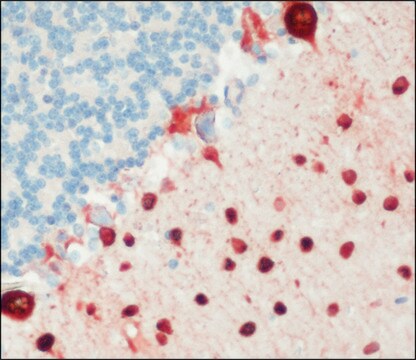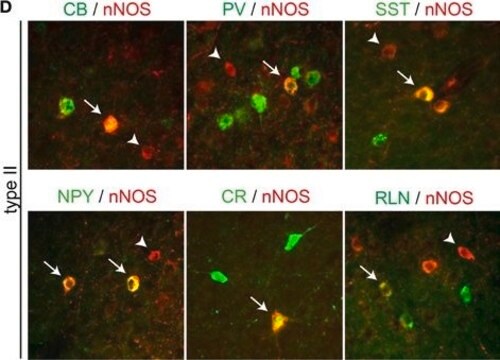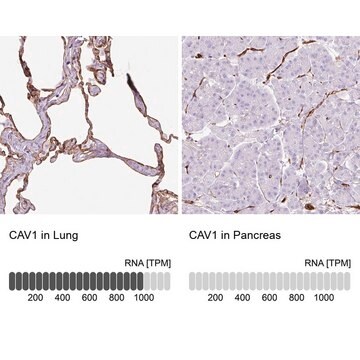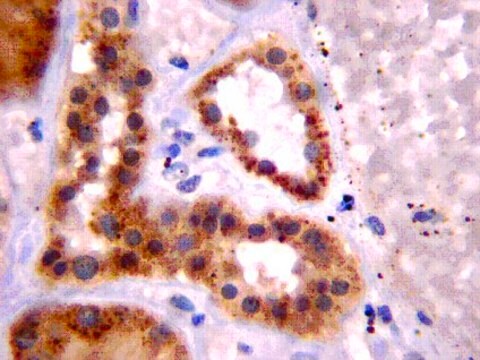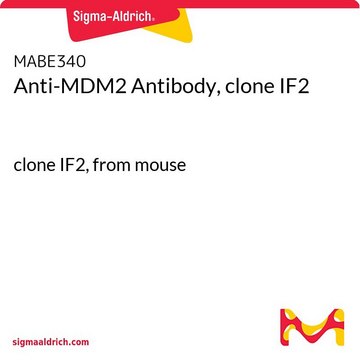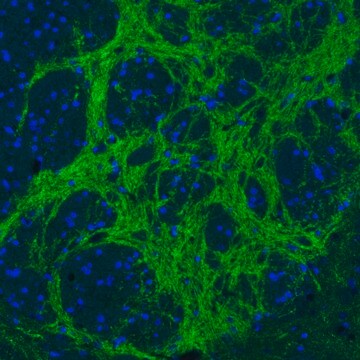所有图片(1)
About This Item
分類程式碼代碼:
12352203
NACRES:
NA.43
共軛:
unconjugated
application:
ELISA
WB
inhibition assay
WB
inhibition assay
無性繁殖:
M974, monoclonal
物種活性:
rabies virus
citations:
技術:
ELISA: suitable
inhibition assay: suitable
western blot: suitable
inhibition assay: suitable
western blot: suitable
推荐产品
生物源
mouse
品質等級
共軛
unconjugated
抗體表格
purified antibody
抗體產品種類
primary antibodies
無性繁殖
M974, monoclonal
分子量
calculated mol wt 33.21 kDa
observed mol wt ~44 kDa
純化經由
using protein G
物種活性
rabies virus
包裝
antibody small pack of 100 μg
技術
ELISA: suitable
inhibition assay: suitable
western blot: suitable
同型
IgG2aκ
表位序列
N-terminal half
UniProt登錄號
運輸包裝
dry ice
目標翻譯後修改
unmodified
一般說明
Phosphoprotein (UniProt: P69480; also known as Protein P, Protein M1) is encoded by the P gene in Rabies virus. Rabies virus belongs to a family of RNA viruses called Rhabdoviridae, genus Lyssavirus. It is most commonly transmitted to humans through the saliva of an infected animal. This genus of virus shares many of the biological and physicochemical features that are associated with other rhabdoviruses. They have similar mechanisms to enter susceptible cells, express and replicate their genome RNA and release mature virus particles from the plasma membrane of infected cells. Rabies virus prototype is organized into five coding regions, N, P, M, G, and L. Viral transcription and replication are catalyzed by the viral polymerase complex, composed of the L and P proteins. Rabies virus is reported to bind to nicotinic acetylcholine receptors at the neuromuscular junction and travels toward the spinal cord within axons of peripheral nerves by retrograde fast axonal transport. The virus disseminates within axons in the CNS along neuroanatomical pathways. It replicates in neurons and causes neuronal dysfunction. The phosphoprotein of Rabies virus is a non-catalytic polymerase cofactor and regulatory protein that plays a role in viral transcription and replication. It is a multifunctional protein that is indispensable not only for viral replication but also for evasion of host innate immunity. It establishes a trimeric form when phosphorylated. It is reported to be phosphorylated at serine 162, 210, and 271 by protein kinase C. The trimmer is stabilized by binding to the L protein. It also binds to the soluble protein N+D12, preventing it from encapsidating non-genomic RNA. It is reported to interact with host DYNLL1 and DYNLL2 via amino acids 138-172 and this interaction may play a role in intracellular microtubule-dependent virus transport of incoming virus. It is also reported to inhibits host IFN- and IFN-β signaling by binding and retaining phosphorylated STAT1 in the cytoplasm or by inhibiting the DNA binding of STAT1 in the nucleus. Five isoforms of Rabies virus phosphoprotein have been described that are produced by alternative initiation. Clone M974 binds to the antigenic site consisting of amino acids 53-66 in the native P protein. (Ref.: Okada, K., et al. (2016). J. Virol. 90(18); 8226-8237; Nadin-Davis, SA., et al. (2000). J. Clin. Microbiol. 38(4); 1397-1403).
特異性
Clone M974 is a mouse monoclonal antibody that detects phosphoprotein of Rabies virus. It targets an epitope within 30 amino acids from the N-terminal half.
免疫原
GST-tagged recombinant phosphoprotein from Rabies virus, strain Arctic Fox type I, expressed in E.coli.
應用
Quality Control Testing
Evaluated by Western Blotting with recombinant Rabies Virus Phosphoprotein.
Western Blotting Analysis: 1: 500,000 dilution (1 ng/mL) of this antibody detected recombinant Rabies Virus Phosphoprotein.
Tested applications
Western Blotting Analysis: A representative lot detected Rabies Virus Phosphoprotein in Western Blotting applications (Nadin-Davis, S.A., et al. (2000). J Clin Microbiol. 38(4):1397-1403).
ELISA Analysis: A representative lot detected Rabies Virus Phosphoprotein in ELISA applications (Nadin-Davis, S.A., et al. (2000). J Clin Microbiol. 38(4):1397-1403).
Inhibition Assay: A representative lot of this antibody inhibited binding of Rabies virus phosphoprotein in a competitive binding assay. (Nadin-Davis, S.A. , et al. (2000). J Clin Microbiol. 38(4):1397-403).
Note: Actual optimal working dilutions must be determined by end user as specimens, and experimental conditions may vary with the end user
Evaluated by Western Blotting with recombinant Rabies Virus Phosphoprotein.
Western Blotting Analysis: 1: 500,000 dilution (1 ng/mL) of this antibody detected recombinant Rabies Virus Phosphoprotein.
Tested applications
Western Blotting Analysis: A representative lot detected Rabies Virus Phosphoprotein in Western Blotting applications (Nadin-Davis, S.A., et al. (2000). J Clin Microbiol. 38(4):1397-1403).
ELISA Analysis: A representative lot detected Rabies Virus Phosphoprotein in ELISA applications (Nadin-Davis, S.A., et al. (2000). J Clin Microbiol. 38(4):1397-1403).
Inhibition Assay: A representative lot of this antibody inhibited binding of Rabies virus phosphoprotein in a competitive binding assay. (Nadin-Davis, S.A. , et al. (2000). J Clin Microbiol. 38(4):1397-403).
Note: Actual optimal working dilutions must be determined by end user as specimens, and experimental conditions may vary with the end user
Anti-Rabies Virus Phosphoprotein, clone M974, Cat. No. MABF3148, is a mouse monoclonal antibody that detects Rabies Virus Phosphoprotein and is tested for use in ELISA, Inhibition Assay, and Western Blotting.
外觀
Purified mouse monoclonal antibody IgG2a in PBS without azide.
儲存和穩定性
Store at -10°C to -25°C. Handling Recommendations: Upon receipt and prior to removing the cap, centrifuge the vial and gently mix the solution. Aliquot into microcentrifuge tubes and store at -20°C. Avoid repeated freeze/thaw cycles, which may damage IgG and affect product performance.
其他說明
Concentration: Please refer to the Certificate of Analysis for the lot-specific concentration.
免責聲明
Unless otherwise stated in our catalog or other company documentation accompanying the product(s), our products are intended for research use only and are not to be used for any other purpose, which includes but is not limited to, unauthorized commercial uses, in vitro diagnostic uses, ex vivo or in vivo therapeutic uses or any type of consumption or application to humans or animals.
未找到合适的产品?
试试我们的产品选型工具.
儲存類別代碼
12 - Non Combustible Liquids
水污染物質分類(WGK)
WGK 2
閃點(°F)
Not applicable
閃點(°C)
Not applicable
我们的科学家团队拥有各种研究领域经验,包括生命科学、材料科学、化学合成、色谱、分析及许多其他领域.
联系技术服务部门